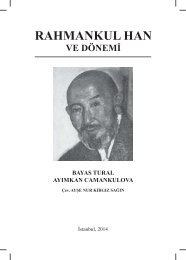THE SOVIET HISTORIOGRAPHY AND THE QUESTION OF KAZAKHSTAN’S HISTORY
SOVYET-TARIH-YAZICILIGI-ENG
SOVYET-TARIH-YAZICILIGI-ENG
Create successful ePaper yourself
Turn your PDF publications into a flip-book with our unique Google optimized e-Paper software.
<strong>THE</strong> <strong>QUESTION</strong> <strong>OF</strong> <strong>KAZAKHSTAN’S</strong> <strong>HISTORY</strong> 185<br />
taken fundamental place for Russian historians for almost four and a<br />
half centuries. N. Karamzin and S. Solovyov, who are two of the first<br />
Russian historians in the nineteenth century, included the writings<br />
of this author in their works without even analyzing it, promoting all<br />
other Russian historians to repeat their assessment without question. 338<br />
Russian poets and literary types were impressed and influenced from<br />
these interpretations too. For example, the Russian poet Alexander<br />
Pushkin wrote that, Mongolians (Golden Horde) were “Arabs who<br />
have no Aristotle and algebra” and therefore they were deprived of<br />
giving a culture that could enrich the Russian lands. Pushkin stated<br />
that, “Golden Horde’s impression on Russia was on such a really low<br />
level that it cannot compare to the Arabs’ impression on the west.” 339<br />
While the approach to Golden Horde and its history was maintained<br />
far into the time of Peter I, attempts were made to erase the traces<br />
of Golden Horde in Russia, to achieve some serious reforms, and to<br />
transform Russia into a “western” state. The USSR moved everything<br />
forward though. In 1944, during the Second World War, which was<br />
namely a life or death situation for Russians, and in which Russian lost<br />
millions of citizens, the USSR Communist Party forbade the research of<br />
Golden Hordes’ history completely. This prohibition was symbolically<br />
important because of the Edigey Legend, which was based on the<br />
conflict between Toktamis, the khan of Golden Horde, and Emir Timur. 340<br />
This prohibition caused an interesting situation. The history books<br />
written during this prohibition ignored this two-hundred and fifty years<br />
of Golden Horde. Thus, Russian history books written in the time of<br />
USSR have the Tsarist Russia’s origins (Fifteenth century) beginning<br />
right after Kiev Russia’s collapse (Twelfth Century). In the earlier<br />
writings and Soviet history books, which were penned before this<br />
prohibition, Golden Horde was mentioned negatively and repeatedly<br />
as follows “Golden Horde, was far behind the west in the terms of its<br />
cultural development. Golden Horde’s dominance caused the Russian<br />
economy, agriculture, construction, and crafts to regress….”<br />
Besides, the exceptions such as Lev Nikolayevich Gumilyov and<br />
the Russian historians who fled abroad and founded the study of<br />
Eurasianism, Soviet historians always approached Golden Horde in<br />
338 For the approach of Russian historians to general history of Golden Horde and Tatar,<br />
see P. H. Alişev, “İzvraşenie i Falsifikatsiya İstorii Tatar v Russkoy İstoriçeskoy Nauke”, Tatarskiy<br />
Narod Posle 1552 Goda: Poteri i Priobreteniya, Kazan 2003, pp. 235-240; Kamalov, İlyas,<br />
Altın Orda ve Rusya. Rusya Üzerindeki Türk-Tatar Etkisi, pp. 51-55.<br />
339 d’Encausse, H. C. Tamamlanmamış Rusya, (Translation R. Uzmen), Ötüken Press, İstanbul<br />
2003, p. 46-47.<br />
340 Edigey Destanı, prepared by. R. Sultî, Türksoy Press, İstanbul (t).



